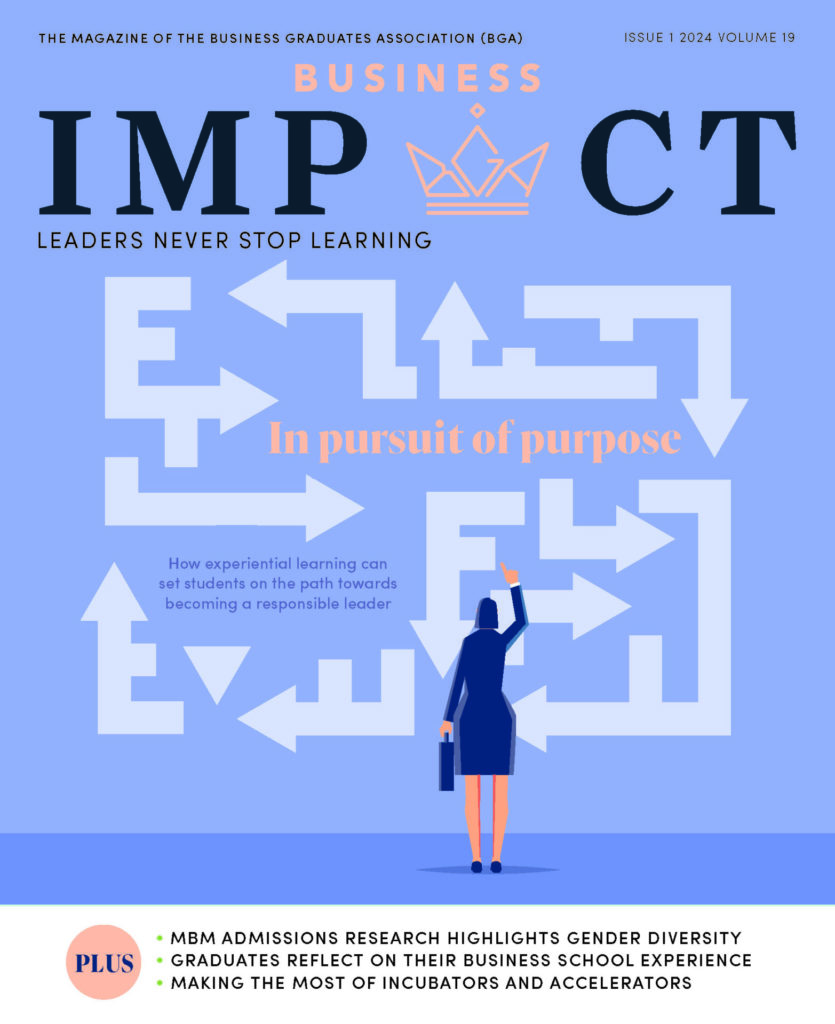At the close of the United Nations (UN) Climate Change Conference in 2021 (COP26), an article in the Financial Times reported that although global executives welcomed the deal reached at the close of the summit, many felt that it didn’t go far enough. Indeed, the article continued, business leaders pointed out that some companies are showing greater urgency than governments when it comes to global warming.
It’s not just climate change; many other global challenges have been forcing their way onto the management agenda too: biodiversity collapse, #BlackLivesMatter, #MeToo and the genocide in Xinjiang in western China.
We tend to think these kinds of global challenges are for governments to deal with – and they are, but not alone. Increasingly, citizens (whether customers, employees, or users of public services) expect public and private sector organisations to be playing a leadership role in tackling global challenges too. And more and more business leaders are responding and beginning to play a broader leadership role – leading change in their organisations and speaking out on public platforms; using their influence to advocate for wider change.
To explore exactly how business leaders have been finding their leadership role changing in practice, Hult International Business School has led research that engages with CEOs and senior executives at organisations recognised as leading on sustainability and global challenges. Involving interviews with CEOs at the forefront of this trend, this suggests that many of today’s business leaders have come to recognise they need a different mindset and skillset to their predecessors.
What implications does this have for how we develop business leaders? And what does that mean for business schools?
A new leadership role and mindset
A generation ago, a leader’s role was to keep their head down and focus on the numbers. Challenges in society were the job of political and activist leaders. For business leaders to get involved would be a distraction; it would lack legitimacy and would end up adding cost to the bottom line. It wasn’t their job.
But in today’s world, many business leaders have come to realise that they need a different mindset to be successful. They need to view “addressing societal and sustainability challenges” as sitting at the heart of their job description; it is core to their job to be playing a leadership role, alongside civil society and political leaders, in tackling global challenges. And doing so is key to how they create and add value for their organisations, their investors and their other stakeholders. They are leaders in society as much as leaders of the business. Rather than seeing a trade-off between doing good and making money, leaders need to aim to achieve each through the other.
This shift in thinking around the scope of the leadership role of today’s senior executive is leading to a shift in emphasis regarding the kinds of activities to which business leaders devote time and energy, both inside and outside the organisation.
Leading culture change in organisations
More and more leadership teams have been putting action on global sustainability challenges at the centre of their corporate strategies. Bringing such strategies to life requires substantial cultural change in organisations that have been geared towards maximising short-term returns to shareholders above all else.
This creates a leadership requirement for facilitating the kind of cultural change that helps all employees across an organisation to prioritise action on sustainability. The chief executives we spoke to talked of seeing their own role in influencing change in their organisations in terms of opening up the space for others to behave differently – through the goals they articulated and the rationales they developed for pursuing them; the stories and people they celebrated; the conversations they started; the questions they asked; what they were seen to spend their own time doing, and which individuals and groups got recognised and rewarded and for what. All this helped create space and safety for others in the organisation to depart from the norm and embrace action that helped achieve sustainability goals.
But our interviews showed that senior executives are also recognising their leadership role in the wider ecosystem around their organisation. They’re not just taking their external environment as a given they have to respond to, but something they have a role and responsibility in shaping actively – leading change in consumer and supplier behaviour, industry norms and government policy. Some are leading collaboratively with industry competitors, NGOs and governments where challenges need to be tackled and only collective, systemic solutions will do.
This new horizon to their role has required leaders to develop skills in areas that have not, historically, been a conventional part of their repertoire: contributing to public debate with an informed point of view; relating well with multiple constituencies; engaging in dialogue to understand and empathise with groups and communities with perspectives different to their own and engaging in multi-stakeholder collaboration with unconventional partners.
Take consumer goods giant Unilever. Former CEO Paul Polman launched Unilever’s Sustainable Living Plan in 2010 – a 10-year strategy to double the size of the business by 2020 – by setting targets such as helping a billion people to improve their hygiene habits; bringing safe drinking water to 500 million people; doubling the proportion of the food portfolio meeting stringent nutrition standards; halving the greenhouse gas impact of Unilever products across their lifecycle, and sourcing 100 per cent of raw materials sustainably.
Over the course of the implementation of this strategy, many of these targets were met and good progress was made on many others. Unilever has become a benchmark for others to emulate. A corporate strategy with goals such as this has required leaders to drive cultural change within the organisation, but also to lead change in consumer behaviour plus change among suppliers and competitors across industry sectors, and to engage with governments to lead change in policy frameworks.
Consider the goal to halve the greenhouse gas impact of Unilever products across their lifecycle and think about laundry detergents. Part of achieving that goal is within Unilever’s control through, for example, reducing energy usage in the manufacturing process of the detergent and innovating in product design to bring to market detergents that work well at lower washing temperatures. This reduces the carbon footprint of heating water during the consumer use phase.
But consumers still need to be influenced and persuaded to switch to washing at lower temperatures – so influencing that behaviour change is part of the leadership role senior executives must now embrace. And both Unilever’s own manufacturing facilities and consumers’ washing machines rely on electricity supplied through national infrastructure; for Unilever to achieve its own goal of halving carbon footprint across the product lifecycle, it needs governments to act to boost renewables and phase out fossil fuel power generation. So, Unilever executives have a leadership role in helping to encourage that to happen.
It is because more and more business leaders are embracing this new kind of leadership role that we see them turning up at COP26 and other UN summits, pushing governments to be more ambitious, and criticising them when they are not.
Implications for business schools
But whether an organisation ends up with senior executives willing to embrace this new kind of leadership role has tended to happen more by chance than design. Over and over again, we hear business leaders say that “nothing in my career or my training prepared me for this”. With the pressures now pushing organisations to embrace the sustainability agenda, there is a need to be more deliberate in consciously nurturing these kinds of outlooks and skills through management education. How can you be proactive in developing the mindsets and skills most valuable in today’s leadership context?
We asked business leaders for their perspectives on why it is that some of them have grasped the need to lead in this kind of way, while many of their contemporaries are still operating from an out-of-date leadership blueprint.
While everyone’s story was unique, the clear theme was that certain key experiences had been crucial in influencing and shifting perspectives. For some, it was formative experiences around upbringing, university and business school study. For others, it was influential mentors or first-hand experiences such as engaging with people living in poverty, personal challenges (for example, the impact of climate change) or first-hand experiences of the changing interests of key stakeholders (or engaging in networks that focused on these issues). These stories have some clear implications for business schools.
First, ethics, responsibility and sustainability themes need to be integrated into all management courses. It’s no good if the sustainability course is being undermined by the strategy, marketing and finance courses. There needs to be a joined-up approach to the integration of these topics across the curriculum. That means, for example, talking about stakeholder theory and shared value in strategy and ‘problematising’ consumption.
It means talking about how to influence pro-sustainable behaviour change in marketing – discussing cradle-to-cradle design and the circular economy in operations and innovation; human rights due diligence and the UN Guiding Principles on Business and Human Rights in supply chain management; the weaknesses of GDP growth as a policy goal and the alternatives being developed instead in managerial economics; integrated reporting in accounting; funding of the UN SDGs in finance; addressing conscious and unconscious bias, and fostering diversity, inclusion, equity and belonging in leadership.
There also needs to be a dedicated course somewhere in the curriculum where management students learn about the nature of our global challenges: the climate and ecosystems crises; the ongoing toxic legacies of colonialism and slavery; contemporary human rights challenges – and where they get the chance to talk about political theory and discuss our shifting assumptions about the role of governments and intergovernmental organisations such as the UN and NGOs alongside businesses and the financial system in leading the system transitions we need to see. But beyond the conventional cognitive curriculum, there are several other parts of the management education experience to consider. Where are the opportunities to bring in project-based experiential learning – to give students the chance to bring it all together and integrate it? For example, by inviting businesses and NGOs into the classroom to set students to work on real challenges.
What about leadership simulations, with the chance to develop and practise the skills to engage with multiple different stakeholder groups, and lead partnerships across organisational ecosystems to achieve systems transitions? Where is the proactive facilitation of extra-curricular opportunities for management students to learn – including professional networks and hands-on first-hand experiences?
These kinds of advances to the management education curriculum have implications for the skills of the faculty. How far do you need to be seeking faculty with the skills and interests to lead this kind of work when hiring? How can you encourage and support their own learning? Can you identify the faculty that are already leading on this agenda and champion their work and encourage the sharing of their resources with colleagues? And, of course, how can you role model this new leadership through fronting this kind of system change in your own institutions and campuses and supply chains, and more widely across the management education sector?









